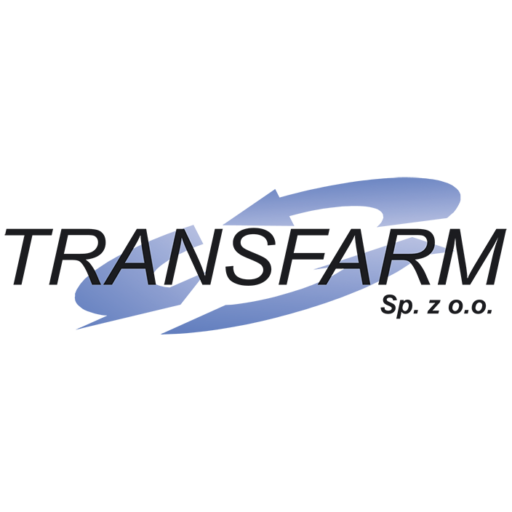INFORMACJA:
Transfarm Sp. z o.o. informuje, że wszelkie znajdujące się na stronie naszej Spółki treści w języku rosyjskim mają charakter informacyjny i zostały zamieszczone z myślą o naszych partnerach oraz klientach posługujących się tym językiem. Transfarm Sp. z o.o. nie sprzedaje jednak ani nie kupuje jakichkolwiek towarów podmiotom i od podmiotów działających lub zarejestrowanych na terytorium Republiki Białorusi oraz Federacji Rosyjskiej.
Kryminalistyczne zestawy oględzinowe
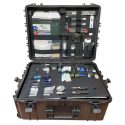 Wiodącym produktem TRANSFARM są uniwersalne zestawy oględzinowe (uniwersalne walizki dochodzeniowo-śledcze), oraz specjalistyczne walizki oględzinowe (walizki kryminalistyczne). Istotnymi walorami produkowanych zestawów jest ich konfiguracja akceptowana lub modyfikowana albo projektowana przez odbiorcę końcowego, stosowanie walizek transportowych odpornych na uszkodzenia mechaniczne i warunki atmosferyczne (obecnie wszystkie nasze zestawy oględzinowe są realizowane w walizkach plastykowych firmy Plastica PANARO) oraz wyposażanie zestawów w materiały i sprzęt kryminalistyczny wysokiej jakości.
Wiodącym produktem TRANSFARM są uniwersalne zestawy oględzinowe (uniwersalne walizki dochodzeniowo-śledcze), oraz specjalistyczne walizki oględzinowe (walizki kryminalistyczne). Istotnymi walorami produkowanych zestawów jest ich konfiguracja akceptowana lub modyfikowana albo projektowana przez odbiorcę końcowego, stosowanie walizek transportowych odpornych na uszkodzenia mechaniczne i warunki atmosferyczne (obecnie wszystkie nasze zestawy oględzinowe są realizowane w walizkach plastykowych firmy Plastica PANARO) oraz wyposażanie zestawów w materiały i sprzęt kryminalistyczny wysokiej jakości.
więcej
Narkotesty NARK® i NARK® II
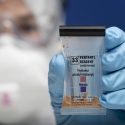 Testy NARK wykorzystywane są do wstępnej identyfikacji dużej grupy występujących na rynku środków odurzających i substancji psychotropowych. Aby dostosować formę testów do potrzeb mają one postać testów torebkowych/saszetkowych tzw. „testy polowe, testów probówkowych/ampułkowych oraz w postaci tamponów z odczynnikiem. O formie wykorzystywanych testów decyduje odbiorca. Producent testów firma SIRCHIE-USA dostosowując produkty do potrzeb, prowadzi permanentne prace nad testami identyfikującymi kolejne, pojawiające się narkotyki. Nowymi testami są testy do wykrywania tzw. „dopalaczy” i „tabletek gwałtu”.
Testy NARK wykorzystywane są do wstępnej identyfikacji dużej grupy występujących na rynku środków odurzających i substancji psychotropowych. Aby dostosować formę testów do potrzeb mają one postać testów torebkowych/saszetkowych tzw. „testy polowe, testów probówkowych/ampułkowych oraz w postaci tamponów z odczynnikiem. O formie wykorzystywanych testów decyduje odbiorca. Producent testów firma SIRCHIE-USA dostosowując produkty do potrzeb, prowadzi permanentne prace nad testami identyfikującymi kolejne, pojawiające się narkotyki. Nowymi testami są testy do wykrywania tzw. „dopalaczy” i „tabletek gwałtu”.
więciej
Proszki daktyloskopijne
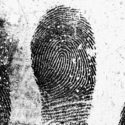 Oferowane przez nas proszki daktyloskopijne to najlepsza czułość, przyczepność i możliwości reprodukcji spośród wszystkich dostępnych proszków. Użyj ich, aby uzyskać doskonałe rezultaty. Stosowanie odpowiedniego proszku jest niezwykle ważne.
Oferowane przez nas proszki daktyloskopijne to najlepsza czułość, przyczepność i możliwości reprodukcji spośród wszystkich dostępnych proszków. Użyj ich, aby uzyskać doskonałe rezultaty. Stosowanie odpowiedniego proszku jest niezwykle ważne.
Proszki daktyloskopijne niemagnetyczne, magnetyczne, bichromatyczne, proszki specjalne, proszki fluorescencyjne, proszki w zawiesinach i inne…
Proszki daktyloskopijne firmy SIRCHIE
Proszki daktyloskopijne firmy BVDA
System Protektor – zabezpieczenia przed podsłuchem
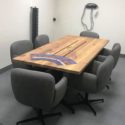 Urządzenia Systemu Protektor przeznaczone są do zabezpieczania pomieszczeń (sal konferencyjnych, gabinetów itp.) przed podsłuchem realizowanym za pomocą technicznych środków zapisu i transmisji audio. Generatory urządzeń emitują barierę w postaci zmiennego losowo białego szumu w paśmie bliskich ultradźwięków, który skutecznie zakłóca mikrofony urządzeń elektronicznych służących rejestracji lub transmisji audio takich jak dyktafony, telefony komórkowe, mikronadajniki radiowe, itp.
Urządzenia Systemu Protektor przeznaczone są do zabezpieczania pomieszczeń (sal konferencyjnych, gabinetów itp.) przed podsłuchem realizowanym za pomocą technicznych środków zapisu i transmisji audio. Generatory urządzeń emitują barierę w postaci zmiennego losowo białego szumu w paśmie bliskich ultradźwięków, który skutecznie zakłóca mikrofony urządzeń elektronicznych służących rejestracji lub transmisji audio takich jak dyktafony, telefony komórkowe, mikronadajniki radiowe, itp.
Urządzenia Systemu Protektor emitują sygnał w wycinkowych wąskich pasmach dźwięku akustycznego i ponadakustycznego.
wiecej
Znaczniki śladów – numerki, strzałki. skalówki (przymiary fotograficzne)
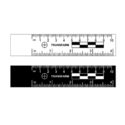 Znaczniki w postaci numerków, skalówek (przymiarów fotograficznych) i strzałek są nieodłącznymi atrybutami oględzin miejsca zdarzenia. Służą one do oznaczenia kolejnymi numerami ujawnianych śladów oraz do przedstawienia ich usytuowania i wielkości. Numerki mogą mieć postać numerków plastikowych dwustronnych lub stojących typu „daszek” oraz numerków magnetycznych. Wielkość numerków powinna być dostosowana do wielkości śladów.
Znaczniki w postaci numerków, skalówek (przymiarów fotograficznych) i strzałek są nieodłącznymi atrybutami oględzin miejsca zdarzenia. Służą one do oznaczenia kolejnymi numerami ujawnianych śladów oraz do przedstawienia ich usytuowania i wielkości. Numerki mogą mieć postać numerków plastikowych dwustronnych lub stojących typu „daszek” oraz numerków magnetycznych. Wielkość numerków powinna być dostosowana do wielkości śladów.
Zestawy znaczników są na wyposażeniu naszych zestawów oględzinowych.
więcej
Przenośny stolik daktyloskopijny DS-64 nowa wersja!
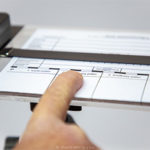 Wprowadzamy do oferty nową wersję przenośnego stolika daktyloskopijnego oznaczonego jako model DS-64, jest to następca stolika DS-63 bardzo cenionego przez naszych odbiorców. Sama zasada działania stolika nie została zmieniona, jednak poprawiliśmy jego konstrukcje i dołożyliśmy wszelkich starań aby poprawić komfort pracy poprzez zmianę zastosowanych materiałów oraz zmniejszenie wagi całego zestawu.
Wprowadzamy do oferty nową wersję przenośnego stolika daktyloskopijnego oznaczonego jako model DS-64, jest to następca stolika DS-63 bardzo cenionego przez naszych odbiorców. Sama zasada działania stolika nie została zmieniona, jednak poprawiliśmy jego konstrukcje i dołożyliśmy wszelkich starań aby poprawić komfort pracy poprzez zmianę zastosowanych materiałów oraz zmniejszenie wagi całego zestawu.
Stolik daktyloskopijny przenośny DS-64 jest rozwiązaniem konstrukcyjnym nie mającym swojego odpowiednika w żadnej z firm kryminalistycznych na świecie.
więcej
Urządzenia RUVIS do lokalizacji śladów daktyloskopijnych i śladów biologicznych
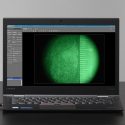 Zestawy urządzeń RUVIS stanowią nową ofertę firmy SIRCHIE. Pozwalają one na bezpośrednią lokalizację na podłożu występujących na nim śladów daktyloskopijnych, bez konieczności wcześniejszego ich ujawniania. Lokalizacji śladów na podłożu możemy dokonywać przy pomocy jednoobiektywowej kamery KRIMESITE™ IMAGER. Zaletą tej kamery jest możliwość stosowania dużych powiększeń śladu oraz bezpośredniego fotografowania widocznych śladów. Innym rozwiązaniem jest połączenie kamery KRIMESITE™ IMAGER z komputerem. Rozwiązanie to pozwala na bezpośrednie zapisywanie w komputerze zdigitalizowanych śladów.
Zestawy urządzeń RUVIS stanowią nową ofertę firmy SIRCHIE. Pozwalają one na bezpośrednią lokalizację na podłożu występujących na nim śladów daktyloskopijnych, bez konieczności wcześniejszego ich ujawniania. Lokalizacji śladów na podłożu możemy dokonywać przy pomocy jednoobiektywowej kamery KRIMESITE™ IMAGER. Zaletą tej kamery jest możliwość stosowania dużych powiększeń śladu oraz bezpośredniego fotografowania widocznych śladów. Innym rozwiązaniem jest połączenie kamery KRIMESITE™ IMAGER z komputerem. Rozwiązanie to pozwala na bezpośrednie zapisywanie w komputerze zdigitalizowanych śladów.
więcej
